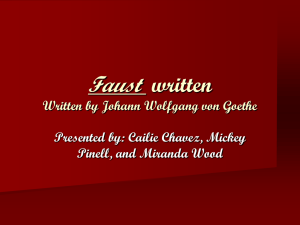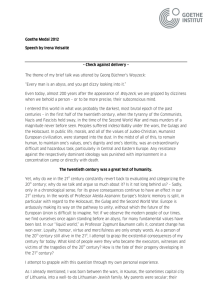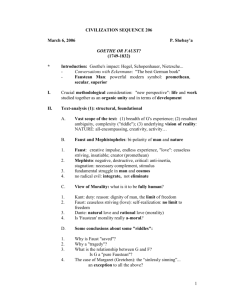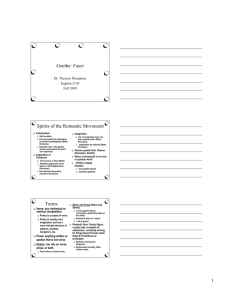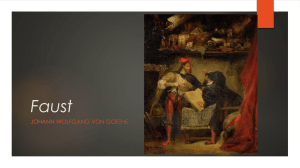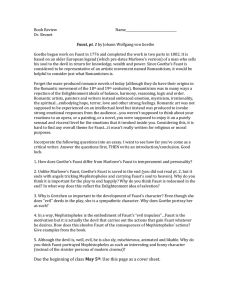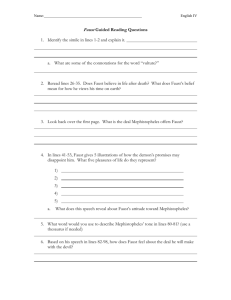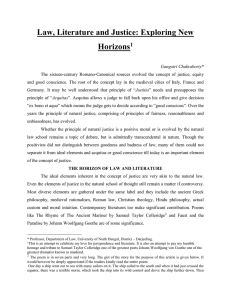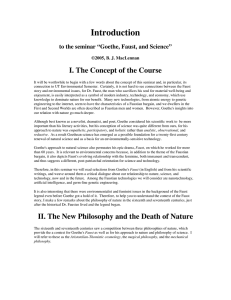Goethe, Faust, and Science
advertisement
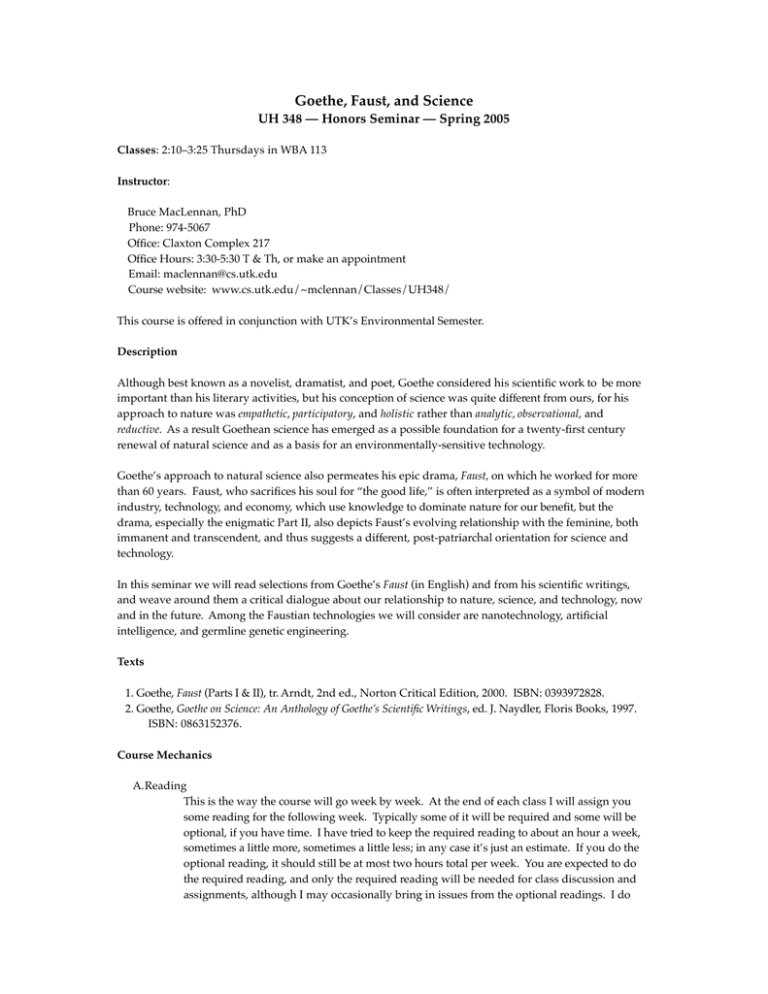
Goethe, Faust, and Science UH 348 — Honors Seminar — Spring 2005 Classes: 2:10–3:25 Thursdays in WBA 113 Instructor: Bruce MacLennan, PhD Phone: 974-5067 Office: Claxton Complex 217 Office Hours: 3:30-5:30 T & Th, or make an appointment Email: maclennan@cs.utk.edu Course website: www.cs.utk.edu/~mclennan/Classes/UH348/ This course is offered in conjunction with UTK’s Environmental Semester. Description Although best known as a novelist, dramatist, and poet, Goethe considered his scientific work to be more important than his literary activities, but his conception of science was quite different from ours, for his approach to nature was empathetic, participatory, and holistic rather than analytic, observational, and reductive. As a result Goethean science has emerged as a possible foundation for a twenty-first century renewal of natural science and as a basis for an environmentally-sensitive technology. Goethe’s approach to natural science also permeates his epic drama, Faust, on which he worked for more than 60 years. Faust, who sacrifices his soul for “the good life,” is often interpreted as a symbol of modern industry, technology, and economy, which use knowledge to dominate nature for our benefit, but the drama, especially the enigmatic Part II, also depicts Faust’s evolving relationship with the feminine, both immanent and transcendent, and thus suggests a different, post-patriarchal orientation for science and technology. In this seminar we will read selections from Goethe’s Faust (in English) and from his scientific writings, and weave around them a critical dialogue about our relationship to nature, science, and technology, now and in the future. Among the Faustian technologies we will consider are nanotechnology, artificial intelligence, and germline genetic engineering. Texts 1. Goethe, Faust (Parts I & II), tr. Arndt, 2nd ed., Norton Critical Edition, 2000. ISBN: 0393972828. 2. Goethe, Goethe on Science: An Anthology of Goethe’s Scientific Writings, ed. J. Naydler, Floris Books, 1997. ISBN: 0863152376. Course Mechanics A.Reading This is the way the course will go week by week. At the end of each class I will assign you some reading for the following week. Typically some of it will be required and some will be optional, if you have time. I have tried to keep the required reading to about an hour a week, sometimes a little more, sometimes a little less; in any case it’s just an estimate. If you do the optional reading, it should still be at most two hours total per week. You are expected to do the required reading, and only the required reading will be needed for class discussion and assignments, although I may occasionally bring in issues from the optional readings. I do hope you will read everything if you are able, since it is all worthwhile. (An up-to-date reading schedule is available also on the course website, <www.cs.utk.edu/~mclennan/ Classes/UH348>.) B. Discussion When I assign a week’s readings, I will often suggest some questions or issues to think about for those readings. However, if you have any other thoughts or insights, especially as they relate to the environment, you should make a note of them for class discussion. At the beginning of each class I may ask you some questions to make sure everyone is doing the reading. Then I will lead a discussion of the passages we have read, highlighting the ideas that I think are important and often beginning with a short presentation. This is just the starting point and basis for the discussion; I hope you will also raise issues that you find thought-provoking, confusing, or otherwise interesting. Although the discussion will normally focus on the week’s reading, it may range back over prior readings or even look ahead. Assignments Towards the end of semester I will assign a short term paper or a set of essay questions. Details will be settled later. Grades will be based on this and class participation. Readings for Next Week A.Assignment 1.Optional: Dedication; Prelude in Theater (1–242) 2.Required: next three scenes: Prologue in Heaven; Night; Outside the City Gate (243–1177) 3. If you have the time, it would be great if you could read the one or both of the next two scenes, both in Faust’s Study, and then we can get a little ahead of schedule. B. Questions/issues to think about or to notice: Prologue: 1.Why does the Lord make the wager with Mephistopheles? 2. How is the heavenly realm different from the earthly? 3. Mephistopheles’ opinions of humans and of Faust. 4. The “spirits of negation.” Night: 1. How would you characterize Faust’s mental state in modern terms? 2. The Earth Spirit and Faust’s interaction with it. 3. What does the Earth Spirit represent? 4. How are Faust and Wagner alike and different? 5. Description of Care. City Gate: 1. Contrast between Faust’s and Wagner’s moods and attitudes. 2. Faust’s “two souls.” 3. Is the behavior of the dog odd or not?
